Article (archive)
Thanks to the recent clamp-down on unauthorized workers and a clamp up on tariffs, owning a yacht is not as much fun as it used to be.
In the last two weeks, with crushing tariffs leveled against China (which are as high as 245 percent) and 10 percent tariffs currently applied to the European Union, being an American yachtsman instantly became more expensive.
The top hubs for yacht-making are Germany, Holland, Italy, Turkey, Taiwan and China, so even at the lowest end of the tariffs a $20 million yacht made in the EU now runs to $22 million once it reaches America.
And the room for negotiation is thin.
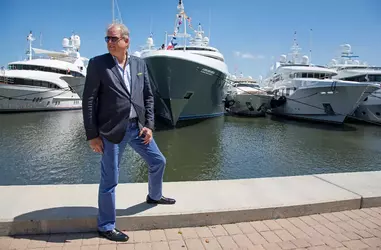
Rolf Smith, a yacht broker based based in Florida, told The Post that prices for boats being purchased by his clients are “already squeezed.”
“Deals are already squeezed,” Rolf Smith, a Florida-based yacht broker, told The Post.
Referencing an example of a client who is having a vessel worked up in Europe, Smith continued, “We’ve negotiated aggressive bid numbers. So, the factory doesn’t have any more wiggle room on the price, and they’re not going to absorb the tariff.
“My client has a yacht being built in Italy, and it would be subject to the tariff charge; so he is canceling the order. My client also canceled on a pair of Ferraris he was going to buy there and have shipped to the United States.”
The would-be yacht owner is now preparing to fly back to the US. Smith will be meeting him in Fort Lauderdale, Florida, to look at a previously owned option instead.
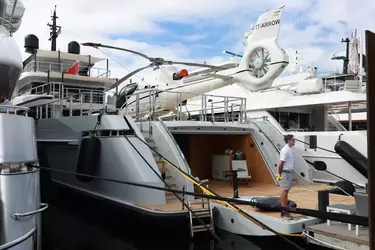
New yachts coming into the United States from Europe and Asia will have costly tariffs attached to them.
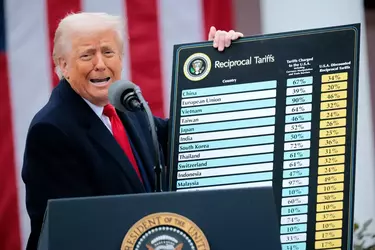
President Donald Trump holding up his tariff chart as he announced his ‘Make America Wealthy Again’ tariff announcement on April 2.
“It’s sitting there, with the duty paid, and we can buy it tomorrow,” said Smith. “Our client is semi-pissed because he got attached to the build. But we managed expectations and he is open to the back-up plan.”
All of this is causing no shortage of mayhem in the yacht industry.
With 60 percent of the yachts sold worldwide bought by Americans, a prime market is experiencing sticker shock. On top of that, the yacht business has been in a slump post pandemic.
When Covid was raging, people feared getting sick and yachts appeared to be mobile islands, putting them in high demand. Now, with many people feeling less compelled to spend most of their time in the middle of the ocean, sales have softened.
As a result, prices have come down and the yacht business has suffered, according to an insider based near the yacht builders in Europe.

Michael Moore, a Florida lawyer who specializes in maritime issues, sees the owners of 80- to 120-foot-long yachts being most impacted by US-applied tariffs.
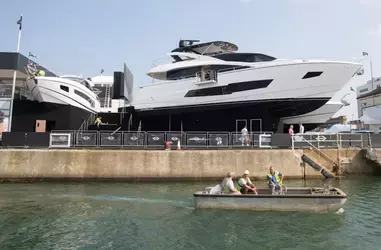
Boat builders, a source told The Post, will be hit hard by the tariffs.
“We were looking for there to be a boom when Trump came into office,” the insider told The Post.
“Our expectation was that taxes and regulations would come down. We thought that would make it easier to own a yacht. Now, the opposite has happened. European ship builders are quite angry. They were relying on US clients.”
But all yacht owners are not created equally.
The ones getting stung the worst are the merely super rich, buying $10 to $20 million yachts — usually in the 80- to 120-foot category.
If you are one of the 5,000 or so billionaires in the world “buying a [super yacht], you will likely register it outside of the United States,” said the yachting insider.
“The very wealthy often have multiple citizenships, they have multiple homes and they have many options. Besides, if it turns out that they have to pay an extra five-or-ten-million in tariffs, they’ll often do it because it is just one more cost on a very expensive boat.”
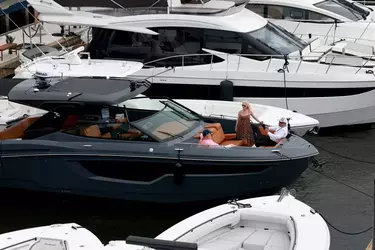
Entering yachting, with a new boat made overseas had gotten more expensive.
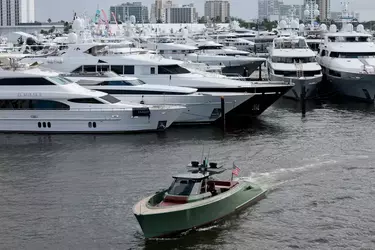
Yacht builders in Europe were expecting the Trump presidency to make yacht ownership easier. Things have not worked out that way.
The merely wealthy, with boats not big enough to sail between the United States and Europe will want to keep their vessels closer to home, say, in southern Florida, and use them for trips to the Caribbean. Hence, they likely will take delivery in the US.
“That’s the unfairness of the world,” Michael Moore, a lawyer who specializes in maritime issues, told The Post. “The little people – and they are not so little – are the ones who get hurt.”
As for the yacht builders themselves, who have more customers in the 80- to 120-foot range than the mega-yacht variety, said Moore, “It’s a disaster.”
He’s referring to the impact the tariffs will have on the new yacht market. The silver lining, though, is for those who are looking to unload their watercraft.
“The used yachts, already landed in the US from Italy or Turkey or the Netherlands, will already have had the duty paid on them,” said Smith. “They’re going to become more in demand.”

Rolf Smith figures that, in regard to traiffs, “things will settle down.”

A model of a yacht by Italian maker Ferretti at a Chinese expo event in Shanghai.
As, no doubt, will crew to man the vessels, particularly ones making short trips from Florida to the Caribbean for personal jaunts or commercial trips.
Super yachts in the Mediterranean are likely to be staffed with fully accredited workers. Those that float locally might have crews that are the equivalent of highly reliable but undocumented handymen who do home repairs for cash.
Until recently, they were hired with little interference. “I’ve heard about these 80- or 90-foot boats getting stopped,” said Smith, who made clear he only works with vetted crews and makes sure that all workers have necessary passports and visas.
However, he has heard stories about other crews, adding: “There have been some stopped with illegal crew members who did not have the necessary permits to work in the US. Arrests have been made. They’re tightening up on doing spot boarding and checking people’s papers.
“[But] overall, I think things will settle down [in terms of tariffs]. We’ll find out pretty soon.”
Thanks to the recent clamp-down on unauthorized workers and a clamp up on tariffs, owning a yacht is not as much fun as it used to be.
In the last two weeks, with crushing tariffs leveled against China (which are as high as 245 percent) and 10 percent tariffs currently applied to the European Union, being an American yachtsman instantly became more expensive.
The top hubs for yacht-making are Germany, Holland, Italy, Turkey, Taiwan and China, so even at the lowest end of the tariffs a $20 million yacht made in the EU now runs to $22 million once it reaches America.
And the room for negotiation is thin.

Rolf Smith, a yacht broker based based in Florida, told The Post that prices for boats being purchased by his clients are “already squeezed.”
“Deals are already squeezed,” Rolf Smith, a Florida-based yacht broker, told The Post.
Referencing an example of a client who is having a vessel worked up in Europe, Smith continued, “We’ve negotiated aggressive bid numbers. So, the factory doesn’t have any more wiggle room on the price, and they’re not going to absorb the tariff.
“My client has a yacht being built in Italy, and it would be subject to the tariff charge; so he is canceling the order. My client also canceled on a pair of Ferraris he was going to buy there and have shipped to the United States.”
The would-be yacht owner is now preparing to fly back to the US. Smith will be meeting him in Fort Lauderdale, Florida, to look at a previously owned option instead.

New yachts coming into the United States from Europe and Asia will have costly tariffs attached to them.

President Donald Trump holding up his tariff chart as he announced his ‘Make America Wealthy Again’ tariff announcement on April 2.
“It’s sitting there, with the duty paid, and we can buy it tomorrow,” said Smith. “Our client is semi-pissed because he got attached to the build. But we managed expectations and he is open to the back-up plan.”
All of this is causing no shortage of mayhem in the yacht industry.
With 60 percent of the yachts sold worldwide bought by Americans, a prime market is experiencing sticker shock. On top of that, the yacht business has been in a slump post pandemic.
When Covid was raging, people feared getting sick and yachts appeared to be mobile islands, putting them in high demand. Now, with many people feeling less compelled to spend most of their time in the middle of the ocean, sales have softened.
As a result, prices have come down and the yacht business has suffered, according to an insider based near the yacht builders in Europe.

Michael Moore, a Florida lawyer who specializes in maritime issues, sees the owners of 80- to 120-foot-long yachts being most impacted by US-applied tariffs.

Boat builders, a source told The Post, will be hit hard by the tariffs.
“We were looking for there to be a boom when Trump came into office,” the insider told The Post.
“Our expectation was that taxes and regulations would come down. We thought that would make it easier to own a yacht. Now, the opposite has happened. European ship builders are quite angry. They were relying on US clients.”
But all yacht owners are not created equally.
The ones getting stung the worst are the merely super rich, buying $10 to $20 million yachts — usually in the 80- to 120-foot category.
If you are one of the 5,000 or so billionaires in the world “buying a [super yacht], you will likely register it outside of the United States,” said the yachting insider.
“The very wealthy often have multiple citizenships, they have multiple homes and they have many options. Besides, if it turns out that they have to pay an extra five-or-ten-million in tariffs, they’ll often do it because it is just one more cost on a very expensive boat.”

Entering yachting, with a new boat made overseas had gotten more expensive.

Yacht builders in Europe were expecting the Trump presidency to make yacht ownership easier. Things have not worked out that way.
The merely wealthy, with boats not big enough to sail between the United States and Europe will want to keep their vessels closer to home, say, in southern Florida, and use them for trips to the Caribbean. Hence, they likely will take delivery in the US.
“That’s the unfairness of the world,” Michael Moore, a lawyer who specializes in maritime issues, told The Post. “The little people – and they are not so little – are the ones who get hurt.”
As for the yacht builders themselves, who have more customers in the 80- to 120-foot range than the mega-yacht variety, said Moore, “It’s a disaster.”
He’s referring to the impact the tariffs will have on the new yacht market. The silver lining, though, is for those who are looking to unload their watercraft.
“The used yachts, already landed in the US from Italy or Turkey or the Netherlands, will already have had the duty paid on them,” said Smith. “They’re going to become more in demand.”

Rolf Smith figures that, in regard to traiffs, “things will settle down.”

A model of a yacht by Italian maker Ferretti at a Chinese expo event in Shanghai.
As, no doubt, will crew to man the vessels, particularly ones making short trips from Florida to the Caribbean for personal jaunts or commercial trips.
Super yachts in the Mediterranean are likely to be staffed with fully accredited workers. Those that float locally might have crews that are the equivalent of highly reliable but undocumented handymen who do home repairs for cash.
Until recently, they were hired with little interference. “I’ve heard about these 80- or 90-foot boats getting stopped,” said Smith, who made clear he only works with vetted crews and makes sure that all workers have necessary passports and visas.
However, he has heard stories about other crews, adding: “There have been some stopped with illegal crew members who did not have the necessary permits to work in the US. Arrests have been made. They’re tightening up on doing spot boarding and checking people’s papers.
“[But] overall, I think things will settle down [in terms of tariffs]. We’ll find out pretty soon.”
